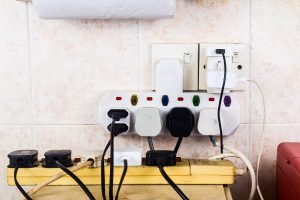Common Home Electrical Problems and How to Fix Them Safely
Got blinking lights or dead outlets? Don’t worry! Many electrical issues can be fixed with a DIY approach, but safety should always come first. Know when to call in the experts. TurnKey Electricals is here to help.
Our skilled team handles all types of electrical problems, ensuring your home stays safe and functional. Don’t take chances with your home’s electrical system—reach out to TurnKey Electricals today.
Let us take the shock out of your electrical worries! Call now, and we’ll have your home powered up safely in no time.
1. Flickering Lights
If your lights flicker, it could be caused by loose bulbs or deeper electrical problems in your home. Start by tightening the bulb. If this doesn’t work, it may be time to hire an electrician to check your wiring. Adding a voltage regulator might also help stabilize your electricity.
- Loose Bulbs: Flickering lights often mean the bulb is loose. Just turn off the light and tighten the bulb. If the flickering stops, your issue is solved.
- Faulty Switches: Worn-out or loose switches can also cause flickering lights. Test the switch by flipping it on and off, watching for sparks or odd sounds. If you notice these signs, it’s time for a new switch. If you’re handy, you can swap it out yourself—just be sure to turn off the power first.
- Wiring Issues: If changing bulbs and switches doesn’t solve the flicker, it may be a wiring issue, which can be dangerous. Call TurnKey Electricals to handle it safely.
2. Tripped Circuit Breakers
Circuit breakers trip when overloaded with too many devices. To fix it, unplug everything, then reset the breaker by flipping it off and back on. If it trips again, find the cause or call an electrician.
 Causes: Circuit breakers often trip due to overloads or faulty appliances, helping to prevent fires. A broken appliance using too much power can also trip the breaker. In addition, bad wiring can cause frequent tripping, as older wires may struggle to handle the electrical flow. Catching these problems early helps avoid bigger issues later.
Causes: Circuit breakers often trip due to overloads or faulty appliances, helping to prevent fires. A broken appliance using too much power can also trip the breaker. In addition, bad wiring can cause frequent tripping, as older wires may struggle to handle the electrical flow. Catching these problems early helps avoid bigger issues later.- DIY Steps: Unplug everything to reduce the load, then reset the breaker. If it stays on, it’s a quick fix. If it trips again, there’s a bigger problem. Check if plugging in a specific appliance triggers the trip—this may point to a faulty appliance rather than an overloaded circuit.
- Consult a Pro: If the breaker trips often, smells like it’s burning, or looks damaged, call an electrician. A professional can diagnose and fix hidden issues, making your home safer.
3. Dead Outlets
If an outlet stops working, start by turning off the power at the circuit breaker. Check for loose wires under the outlet cover and reconnect them if necessary. If that doesn’t work, an electrician might need to fix it.
- Loose Wiring: Dead outlets can be confusing, especially if they suddenly stop working. Often, loose wiring is the cause. Connections can loosen over time, cutting off power. Turn off the outlet’s power and check for loose wires under the cover. If you’re unsure, call a professional.
- Tripped GFCI: Dead outlets are sometimes caused by a tripped GFCI, which cuts off power to prevent shocks. GFCIs are usually found in bathrooms, kitchens, and outdoor areas. Try resetting the GFCI outlets. If that doesn’t work, check the breaker panel for a tripped circuit.
- Professional Help: When DIY solutions don’t work, call an electrician to fix or replace faulty wiring and outlets, ensuring your home’s electrical system works properly.
4. Electrical Shocks
If old outlets shock you, replace them with new, grounded ones. If an appliance shocks you, unplug it and contact an electrician. Installing GFCIs in kitchens and bathrooms can also prevent shocks by cutting power if there’s an issue.
- Common Causes: Shocks are often due to poor grounding or old wiring. These aren’t just annoying—they signal potential risks. Older homes may lack modern safety features that prevent shocks. Grounding is important because it directs excess electricity into the ground, keeping you safe.
- Immediate Actions: If you get shocked, stop using the device or switch and turn off the power at the breaker. It’s important to figure out why it happened, whether it’s a faulty appliance or a deeper electrical problem.
- Expert Help: Don’t ignore repeated shocks—they indicate serious issues. An electrician can inspect for problems like bad grounding or outdated wiring, keeping your home safe.
5. Overloaded Circuits
A common issue is overloading circuits with too many devices. To fix this, unplug unused devices and spread them across different circuits. If the problem persists, consider hiring an electrician to install more outlets or circuits.
 Common Causes: Overloading circuits—especially in older homes—can cause flickering lights and malfunctioning appliances.
Common Causes: Overloading circuits—especially in older homes—can cause flickering lights and malfunctioning appliances.- Safe Solutions: Spread your appliances across different circuits to reduce the load. Unplug devices you aren’t using. Small changes can improve your electrical system significantly.
- Professional Help: If overloading continues, call an electrician to upgrade your circuits. Frequent system failures suggest a deeper issue. Upgrading can improve efficiency and safety.
6. Burning Smell
A burning smell from outlets or devices likely indicates an electrical problem like overload or bad wiring. Quickly turn off and unplug everything nearby, then shut off power at the breaker. Don’t try to fix it yourself—call an electrician.
- Immediate Action: If you notice a burning smell, it could be a sign of a serious electrical issue. Shut off the electricity to prevent further damage or fire. Don’t use any plugs or switches until it’s resolved.
- Professional Help: After turning off the power, contact TurnKey Electricals. We’ll find the cause of the burning smell and repair or replace faulty wiring or parts, ensuring your home is safe.
Safety Tips
Maintaining electrical safety in your home is important for avoiding hazards like shocks, fires, and equipment damage. By staying proactive with regular checks and smart practices, you can reduce risks and keep your electrical system running smoothly.
- Watch for Warning Signs: Always stay alert for warning signs like burning smells, flickering lights, or tripped breakers, as they could indicate larger electrical issues.
 Regular Checks: Conduct regular checks of your electrical system. Look for any signs of wear and tear, such as frayed wires or outdated equipment. Regular maintenance can prevent bigger problems later.
Regular Checks: Conduct regular checks of your electrical system. Look for any signs of wear and tear, such as frayed wires or outdated equipment. Regular maintenance can prevent bigger problems later.- Proper Grounding: Make sure your home has proper grounding, as it helps redirect excess electricity safely, preventing shocks and protecting your devices.
- Install GFCIs: Make sure your kitchen, bathroom, and outdoor outlets have Ground Fault Circuit Interrupters (GFCIs), which cut off power to prevent electrical shocks.
- Don’t Overload Circuits: Spread out the use of devices and appliances across circuits to avoid overloads that can lead to tripped breakers or flickering lights.
Having Common Electrical Problems? Get Help With TurnKey Electricals!
Solving home electrical issues, like flickering lights or dead outlets, can often be simple. But when things get too complex or unsafe, it’s time to call in the professionals. TurnKey Electricals offers reliable, expert service for all your electrical needs, from minor fixes to large-scale projects. Our experienced team ensures your home is safe, efficient, and well-lit.
Don’t wait—contact TurnKey Electricals today! Call us to schedule your service and get the peace of mind you deserve.
 Causes: Circuit breakers often trip due to overloads or faulty appliances, helping to prevent fires. A broken appliance using too much power can also trip the breaker. In addition, bad wiring can cause frequent tripping, as older wires may struggle to handle the electrical flow. Catching these problems early helps avoid bigger issues later.
Causes: Circuit breakers often trip due to overloads or faulty appliances, helping to prevent fires. A broken appliance using too much power can also trip the breaker. In addition, bad wiring can cause frequent tripping, as older wires may struggle to handle the electrical flow. Catching these problems early helps avoid bigger issues later. Common Causes: Overloading circuits—especially in older homes—can cause flickering lights and malfunctioning appliances.
Common Causes: Overloading circuits—especially in older homes—can cause flickering lights and malfunctioning appliances. Regular Checks: Conduct regular checks of your electrical system. Look for any signs of wear and tear, such as frayed wires or outdated equipment. Regular maintenance can prevent bigger problems later.
Regular Checks: Conduct regular checks of your electrical system. Look for any signs of wear and tear, such as frayed wires or outdated equipment. Regular maintenance can prevent bigger problems later.